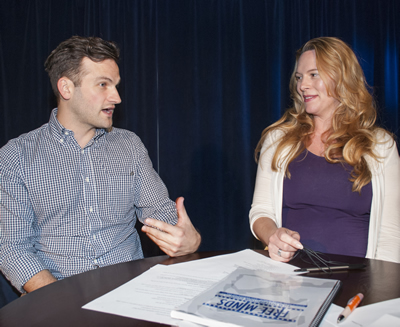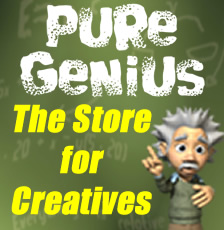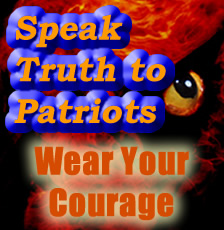Academy Award Winner Dan Lindsay Shares His Story
(Originally published on Blogcirtics.org)
There’s an old joke that in Los Angeles, when you pass a stranger on the street, you don’t say “hello,” you say, “How’s your screenplay coming along.” That may be a slight exaggeration about the city, but it was spot on for audience members who gathered, on May 1, to watch the live-streaming podcast by Free Minds Film Distribution of an interview with 2012 Academy Award winner for best documentary, Dan Lindsay. Lindsay’s film, Undefeated (trailer), takes viewers on a journey with the 2009 Manassas High School Tigers football team from North Memphis, Tennessee, as they struggle to win the first playoff game in the school’s 110 year existence.
 As the audience was seated in the Reason Foundation studio near Culver City, not far from the Sony Pictures lot, hosts Ted and Courtney Balaker bantered with filmmakerLindsay about his Academy Award acceptance speech in which his partner, T.J Martin, managed to drop the “F-Bomb.” The presentation, made by Robert Downey, Jr, and Gwyneth Paltrow, is an unusually fun Oscar moment. One sad but educational element of the acceptance speech was what wasn’t in it.
As the audience was seated in the Reason Foundation studio near Culver City, not far from the Sony Pictures lot, hosts Ted and Courtney Balaker bantered with filmmakerLindsay about his Academy Award acceptance speech in which his partner, T.J Martin, managed to drop the “F-Bomb.” The presentation, made by Robert Downey, Jr, and Gwyneth Paltrow, is an unusually fun Oscar moment. One sad but educational element of the acceptance speech was what wasn’t in it.
Lindsay had intended to thank all the people at Manassas High School and in the Memphis community who helped make the movie a reality. Lindsay’s mother (his date for the Academy Awards) told him to thank the people from the community first. He told her it would be more dramatic if they were thanked last. As often happens at the Oscars, the acceptance ran too long, and they were cut off. Moral: listen to your mother and always thank the most important people first, even if it’s not the Academy Awards, only your sister’s wedding. Lindsay and Martin later apologized in the Memphis paper for not thanking the community on national TV.
As the podcast was about to begin, Lindsay’s fiancée yelled from the first row that he should straighten his shirt: “People can see your skin!” “What”, he replied, “are you saying I have ugly skin?” He pulled his shirt down anyway. They will make a good team.
The interview, part of a series of seminars by Free Minds Film Distribution, covered a wide range of topics from how Lindsay got his start in filmmaking to the ins-and-outs of modern day film distribution.
His start in filmmaking came early. He experimented in school with video and one time when one of his teachers assigned a paper, Lindsay asked if he could do a film instead. The teacher agreed, Lindsay got an “A” and films instead of papers became his default reporting mode for the rest of his high school career. A great start for a documentarian.
After high school, Lindsay “got serious” and decided to pursue a career in accounting. He shared the pivotal moment in his life with Ted and Courtney. “One day I was sitting in an accounting class and I looked around and thought, ‘Do I want to spend the rest of my life with these people?’ I got up, walked out and decided to be a filmmaker.” (My apologies to any accountants who are reading this.)
“Trying to work my way up by getting a job in a studio, as a PA or whatever, didn’t seem like a reasonable path, so I just started making films.”
Lindsay is self-educated. “I didn’t go to film school,” he explained, “but there are things I think I should know about, so I watch a film every morning. Right now, I’m working through French New Wave. When you watch a film, try and absorb as much creative information as you can.” Lindsay said his favorite online resource for learning about film is Cinephilia and Beyond.
Lindsay’s first success was his 2008 effort, Last Cup: Road to the World Series of Beer Pong. It was also around this time that Lindsay first met the Balakers. He was working in a sketch comedy group, and that led to his appearing in Courtney’s short film Cute Couple.
Lindsay explained that Last Cup, like all good documentaries, is not so much about “the conceit”, in this case beer pong, as it is about people. “I reject nine out of ten ideas for documentaries,” he said “because you have to have a compelling story about people, not just a hobby or event. You need dynamic characters that have something they want to achieve. In the time that you watch them they will either achieve or not.
“The other thing is stakes. The stakes have to be high enough so the audience can actually connect to it. Documentary makers are as much storytellers as are narrative filmmakers.”
The Balakers and Lindsay also discussed film distribution and film festivals. “It used to be all about bringing your film to a festival and you sell it and make a bunch of money,but that doesn’t happen so much anymore,” Lindsay said. “But festivals are a way to raise awareness of your film and to get it seen by a distributor,” he explained. “More importantly, festivals are a way to meet other film makers and make contacts.”
During the Q&A from audience members, one observer (me) asked, “About 30 minutes into Undefeated there is a scene where the team is about to watch videos of their last game and a fight breaks out. That looked kind of realty-show fake. Was that a reenactment?”
Lindsay answered, “Absolutely not. Everything in Undefeated was real. That particular scene was boiled down from three and a half hours of tape.
“We were there for nine months and shot over 500 hours of video. We were able to get such good footage because we became part of the team. Eventually, when one of us didn’t show up for whatever reason, people would get concerned that something was wrong.”
As the live podcast wound down, Ted and Courtney ended with the mantra of Free Minds Film Distribution, “Don’t just make a film, get people to see it!”
Undefeated is available on DVD and online.



